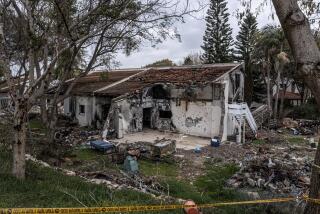Former Dictator Expected to Dispute Rights Report : Chile: Pinochet is preparing a response to findings that 2,115 victims died or disappeared during his rule.
- Share via
SANTIAGO, Chile — Tensions are rising here as Gen. Augusto Pinochet, Chile’s former dictator, prepares his response to a controversial report on human rights abuses and atrocities under his military government.
A rare meeting of the National Security Council is scheduled for Wednesday to discuss the report. As army commander in chief, Pinochet sits on the council and is expected to raise strong objections to the report’s conclusion that military and police personnel were responsible for systematic human rights violations resulting in hundreds of deaths.
Officials in President Patricio Aylwin’s civilian administration hope that Pinochet will temper his objections with some conciliatory language, but the general is said to be unwilling to concede any military guilt. Pinochet and the army have insisted through the years that the bloody 1973 coup and later repression were justified by a climate of internal war that they blame on leftist subversives.
“What is at stake is the historical legitimacy of the military coup,” said Jose Joaquin Brunner, an analyst with a private Chilean research foundation.
The report, prepared by a special presidential commission and made public by Aylwin early in March, does not conclude that a state of war existed, and it notes that, regardless, the torture and killing of prisoners violate rules of war.
Brunner said that if Pinochet’s response to the report is harsh and unyielding, “it could put the president in a very uncomfortable position.” But Brunner and other Chilean analysts say it is unlikely that army anger over the report will jeopardize democratic institutions, because Pinochet also has a historical stake in their success.
The general allowed democratic elections to be held in 1989 and stepped down as president in March of last year. Since then, aside from criticism of his human rights record, he has been widely credited with contributing to a successful democratic transition and leaving the Chilean economy in good order.
Aylwin appointed the Commission for Truth and Reconciliation in May. Headed by jurist Raul Rettig, its mission was to investigate human rights violations that resulted in disappearances or deaths during the 16 1/2 years of military rule.
The voluminous final report documents the deaths or disappearances of 2,115 “victims of the violation of their human rights.”
Most of the cases in the report had been brought to light previously by human rights organizations, political groups and the press. But this is the fullest report and the closest to being an official document.
In presenting the report to the nation, President Aylwin said it was not intended to be the “official truth,” and he said the Chilean state and the entire society were responsible.
His voice broke as he added: “Therefore I dare, in my role as president of the republic, to assume the representation of the whole nation to ask in its name for the pardon of the victims’ families.”
Aylwin also called on the armed forces, “and all who have had participation in the excesses committed, to make gestures of recognition of the pain caused and to collaborate in easing it.”
Leftist parties have criticized the report because it does not name individuals responsible for crimes. The commission has given some suspects’ names and evidence against them to court authorities, but it has insisted that its role was not to bring criminals to justice.
Right-wing parties have accused the commission of blaming security forces for abuses without considering the subversive and violent intentions of many victims.
More to Read
Sign up for Essential California
The most important California stories and recommendations in your inbox every morning.
You may occasionally receive promotional content from the Los Angeles Times.













